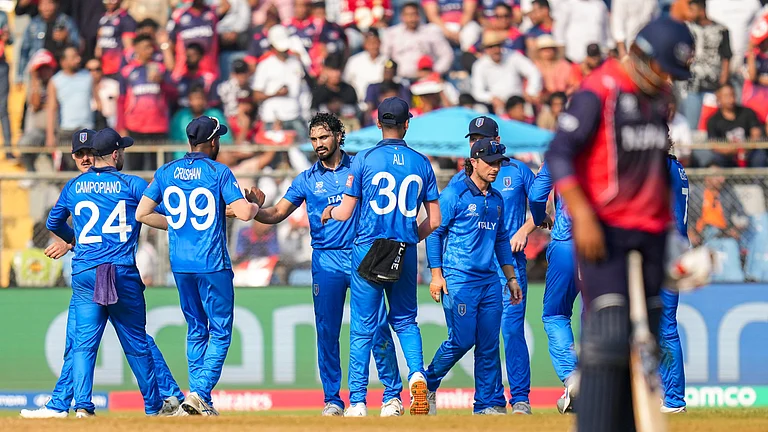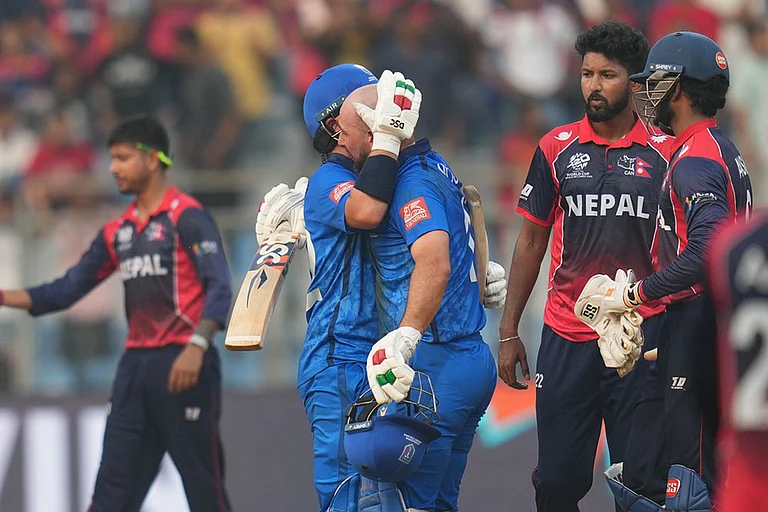Ankur Bhatia has been slowly and steadily leaving a mark in Bollywood. Ever since he did ‘Aarya’, his career has gotten a boost and he has been doing some of the best characters of his life now. ‘Bloody Daddy’ is one of them.
The Shahid Kapoor starrer has been garnering a lot of great reviews from all over, and Ankur Bhatia’s role also has been appreciated. Even though it was a small character, Bhatia has been praised for bringing in that menacing and raging belligerence perfectly in the negative character he portrays in the film.
Talking to Prateek Sur, Ankur Bhatia opens up about ‘Bloody Daddy’, working with Ali Abbas Zafar, being stereotyped in negative characters, his move towards Hollywood, walking out of a big Hollywood film at the last moment, his rapport with Sushmita Sen and lots more. Excerpts:
‘Bloody Daddy’ is getting some great reviews from all over. What was your reaction when you saw the final full film?
I am extremely happy that ‘Bloody Daddy’ is receiving such great reviews and love from the audience. My reaction upon seeing the film was huge. I have never witnessed such a grand film on an OTT platform before, and I was genuinely amazed by its scale. From the scenes to the dubbing, the action sequences, and the overall execution, everything was done remarkably. Particularly, the way we portrayed a song sequence where a chase is happening exuded a level of grandeur rarely seen on an OTT platform. I had a strong feeling that it would change the game, and the initial reactions from viewers align with my thoughts. Many are describing it as a theatrical experience being launched on OTT for the first time. The influx of great reviews is truly amazing, and it fills me with joy.
Your character has this specific scream that he does after every few minutes. Whether it’s in between the fight sequences or while chasing behind the kid or behind Shahid. Was all of that already mentioned in the script or did you get chance to improvise on sets as well?
It's funny that I was one of the last actors to be cast. I met Ali on set just before the shoot. The lines in the script didn't relate to my character Vicky's traits. I discussed it with Ali, and he suggested we play the first scene and see how it develops. As I read the scenes, I envisioned Vicky as someone unique from my previous roles; he is high, wacky, and edgy. I wanted to intentionally make him a bit different. For this particular project, I approached it organically and didn't overprepare. During my first scene, I spontaneously reacted to the situation, and when I saw it on screen, I realized that I could use the fluctuating excitement of the character to my advantage. Even when Vicky was getting punched and beaten up, he still held onto his energy, screaming and laughing. I improvised this approach, and Ali liked it. We continued playing the scenes that way, and it became a defining trait of Vicky.
You’re becoming a master of negative characters. Is a conscious choice to say yes to villainous characters? Or is it that you’re not getting offered other roles?
I strive to do justice to all the negative characters I'm offered. It's not a conscious choice; it's just that, you know, I come from a small part to a slightly bigger part and then to another bigger part. I've never had the option to decline the work that came my way. Until ‘Aarya’ happened, I had no choice but to take on whatever came my way and give it my all. Now, I consciously select even villainous characters, ensuring that it's not repetitive like my roles in ‘Sangram’ or ‘Crackdown 2’. I chose ‘Bloody Daddy’ because the character had a different shade of negativity—it was unique. I learned from the director on the set of ‘Aarya’ that every villain is a hero, so I don't perceive villains as something different from the hero. I approach the role with sincerity, justifying the character delivery in my mind. Now, I'm intentionally gravitating towards non-negative roles, which brings me to ‘Taali’, a project that is completely different from anything I've done before. You'll see that very soon.
You had an entire fight sequence with Shahid Kapoor. How easy or difficult was filming that scene? Did either or you actually got hit while the filming of that intense fight?
I had an elaborate action fight sequence with Shahid, and I absolutely loved it. It wasn't too difficult since I had just finished working on an action web series, so I was already in the training mindset. After shooting for a web series for two weeks, I joined this project, so I was still in the action zone. Shahid Kapoor is incredible at his craft, and the choreography was top-notch. The sequence was quite elaborate, with a lot happening. There were many people involved, and Shahid was fighting multiple opponents simultaneously. It had action that went beyond the ordinary, with a great deal of drama and subtext infused. It was fun and intense. Everyone present was thorough, and we did numerous rehearsals during filming. Given the continuous flow and tight schedule, there wasn't much room for mistakes.
How is Ali Abbas Zafar as a director to work with? Is he a tough task master or does he allow you your freedom and create a space where you can also share your ideas with him?
I loved working with Ali Abbas Zafar. His name had been on my list of directors to work with for a while. Ever since I watched ‘Sultan’, I had hoped for an opportunity to collaborate with him, and it just happened when I was preparing for a web series shoot in Bhopal. However, just a day before the shoot, the web series didn’t work out and got postponed. I returned to Bombay and received a call from Casting Bay, the casting director for this film. They offered me a role, and that's how I got in touch with Ali. The whole process happened so quickly that I didn't have time to fully comprehend that I would be working with Ali Abbas Zafar. I didn't have any preconceived notions about what it would be like. Then I met Ali. The best thing about Ali is that he is also a talented actor. He gave me the freedom to interpret the character as I wanted. As an actor himself, he would discuss the scene with me, guiding me on the boundaries I should not cross and where I could explore and experiment. His feedback was constructive, and it felt like a collaborative effort rather than him being a strict taskmaster. He is an amazing director who knows exactly what he wants. I had a wonderful time shooting with him.
I can’t leave you without asking you about ‘Aarya’. Your character dies in season 2. How shocked were you when you heard that you’re going to die?
I wasn't actually shocked when my character died in Season 2. I had known since day 1 because ‘Aarya’ is an official adaptation of the Dutch show ‘Penoza’, and I had already watched Season 1 and Season 2 of ‘Penoza’ before joining the ‘Aarya’ shoot. I anticipated that they would follow a similar pattern and storyline based on ‘Penoza’, which is where Sangram’s death occurs. So, from the beginning, I had this knowledge. However, I had a slight hope that they might make some changes. But as an actor, our responsibility and duty are to serve the script, so I was happy that my character's death had meaning and made a difference to the story. That's what I wanted, and I believe every actor desires the same. Although I was content with it, I felt a little disappointed because I miss the ‘Aarya’ family a lot. It was a wonderful experience shooting with Sandeep Modi, Vinod Rawat, Sushmita Sen, and the entire team of ‘Aarya’. I would love to be a part of any future ‘Aarya’ projects. I am still in touch and considered part of the family.
Didn’t you fight with Ram Madhvani for not killing your character or atleast request him to keep your character alive?
I don't believe anyone can fight Ram Madhvani. He is incredibly kind and knowledgeable, radiating a calm aura that surpasses anyone I've encountered in the film industry. No one stands a chance against him, and when he expresses his opinions, he always has valid reasons. He is an incredibly thorough and accommodating individual, with absolutely no political agenda. There has never been any disappointment with Mr. Ram Madhvani. Although we've playfully joked about it and I have light-heartedly requested favours to stay alive in the show, it's all in good fun. I truly believe that no one can rival his sweetness as a colleague.
Do you have like flashback sequences or anything in season 3?
There might be a chance of a flashback sequence in the future, I’m not sure yet. I don't think I'm allowed to talk about it.
Sushmita and you had great rapport in Aarya. Will we get to see you both having a similar equation in ‘Taali’?
Yes, I have a great rapport with Sushmita. She is like a part of my family. Working with her has been an amazing experience. We have collaborated for two seasons of Arya, spanning over three years, so I have known her for quite a while. Interestingly, shooting for Arya never felt like work; it was as if I was Sangram and she was Arya, and that's how we played our roles. When we got the opportunity to collaborate again in Taali, it was incredibly exciting to be back on set with her. Taali takes us into a completely different space than Arya, but it still holds a beautiful relationship. I believe the audience would love to see us together once more, and I hope they thoroughly enjoy watching us. The equation we share in Taali is incredibly sweet, and I can't wait for the audience to witness it.
We all know what Sushmita is playing in ‘Taali’. Give us a bit about what’s your character all about?
So, in Taali, I play a homosexual character named Naveen who is a social worker and activist fighting for LGBT rights. He is associated with Sushmita's character in Taali and serves as one of her biggest supports in life. It's a fascinating character that you'll get to witness. Naveen shares a heartfelt bond with Gauri Sawant, portrayed by Sushmita. I'm truly excited for the audience to see it once it's released.
You even were signed on to do a Hollywood film, which you later rejected. What happened? Are you trying to look towards Hollywood more now or are you content with what you’re getting in Bollywood?
I am not trying to look towards Hollywood more. I've actually spent a good number of years living in New York, where I kickstarted my acting career with short films for NYU and film school students. That's how my career began. I have connections here—a trusted agent and manager. A couple of years ago, I worked on a show called ‘Power Book Ghost’ for Lionsgate before Covid hit. Whenever I have time, I read scripts and participate in workshops. Last year, something was in the works, but unfortunately, I fell ill and couldn't make it happen despite efforts to reschedule. I now have some exciting projects in progress that you'll hear about soon. My heart and soul are with Indian cinema but I've also been a wanderer in life and want to explore new horizons. So, when an interesting opportunity arises in a space I haven't explored before, I see it as a challenge and do it. Thus, whenever I have downtime in Mumbai, I actively look out for opportunities in Hollywood. If something interesting shows up, I'm definitely up for giving it a shot.
What next can we see you in?
I have come up with a new film this week on Netflix called ‘Operation Mayfair’. Another film of mine, ‘Taali’, will be released soon. Additionally, I've recently signed on for a new project set to start shooting in July. Once I've completed all the necessary paperwork, I'll have more details to share.



























